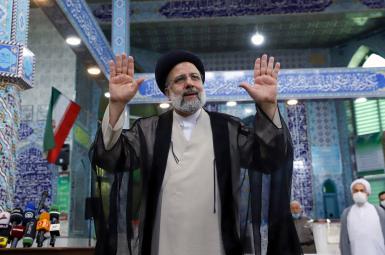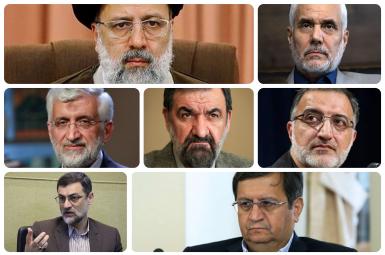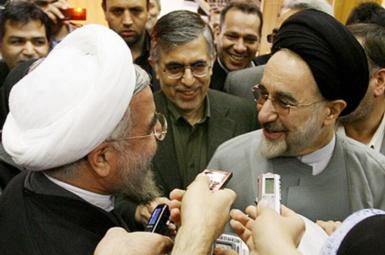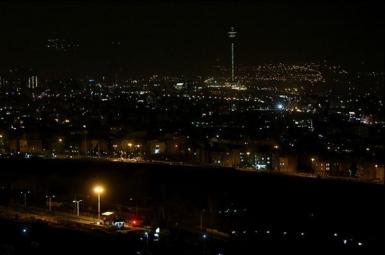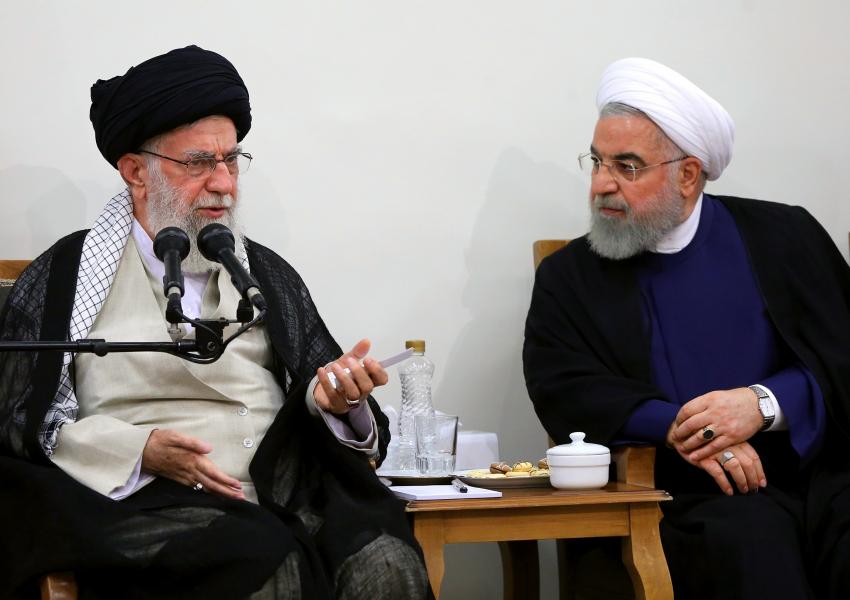
Rouhani Asks Khamenei To Intervene To Legitimize Iran Presidential Election
In a speech at the weekly cabinet meeting on Wednesday, President Hassan Rouhani said he had written to Supreme Leader Ali Khamenei urging him to intervene to reinstate some of the candidates that the election watchdog, the Guardian Council, disqualified for running in the June 18 election.
"Whatever his excellency thinks is expedient," he said, pointing out that while the leader had not often intervened in such cases, it was not unprecedented. "The decision lies with him. What we could do was to appeal to him and ask him to take action in this regard if he finds it expedient."
The Guardian Council is an appointed body loyal to Khamenei that is tasked to check the political and other credentials of candidates and decide who is eligible to run. It makes its decisions in secret, which leads to questions and controversy in every election.
In his televised speech, Rouhani criticized the decision of the election watchdog, half of whose members are appointed by Khamenei and half by parliament, not to include in the list of approved candidates the strongest rivals to Chief Justice Ebrahim Raeesi (Raisi). Among those considered to be strong candidates and not cleared to run were former president Mahmoud Ahmadinejad and Ali Larijani, the former parliament speaker.
Rouhani warned that the legitimacy of the Islamic Republic would be undermined if disillusioned voters shunned the ballot boxes. "We have forgotten that elections guarantee the legitimacy of the system and that it's fundamental," he said, arguing that political decisions lacked legal and religious legitimacy if not supported by the people. He warned that a president lacking such legitimacy would damage the "honor of the system" abroad.
"People created the 22 of Bahman Revolution [in 1979] and overthrew the corrupt former [royalist] regime,” he said. “People went to the polls and 98.2 percent voted for the Islamic Republic [in a referendum in 1979]. Where did the 98.2 percent go? Why is it shrinking?" Rouhani warned of a day when "God forbidding, people feel that we don't care about them or want to decide for them without them.”
Rouhani repeatedly referred to "maximal participation in elections" as a benefit that Khamenei himself had on many occasions emphasized both to him and in public: "Maximal participation can't happen only in words.”
According to the latest telephone poll conducted by the government-affiliated Iranian Students Polling Agency (ISPA) between May 17 and May 20, 43 percent said they would vote. ISPA said the figure was based on a sample of 1564 sample from across the country taking into account factors such as "respondents’ conservatism in answering telephone poll questions and those who do not cooperate with pollsters."
A telephone survey done for Iran International in early May showed only 27 percent of respondents inclined to vote in June.
Unofficial surveys on news websites show different results. Nearly 80 percent of the 37,873 respondents to an online survey in progress by the moderate conservative Asr-e Iran website have chosen an "other decision" option provided in addition to the names of the seven approved candidates. “Other decision" could imply support for would-be candidates not cleared to run and − or − an intention not to vote.
Asr-e Iran's survey was launched on Tuesday, just after the Guardian Council announced the list of the approved candidates. Nearly 12 percent of respondents have favored Raeesi, with Abdolnaser Hemmati next on 3.49 percent. Other candidates score between 1.84 percent (Mohsen Rezaei and Mohsen Mehralizadeh) and 0.48 percent (Amir-Hossein Ghazizadeh).

